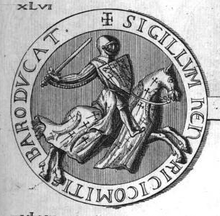Henry III, Count of Bar
| Henry III, Count of Bar | |
|---|---|
 | |
| Born | 1259 |
| Died |
September 1302 Naples |
| Spouse(s) | Eleanor of England, Countess of Bar |
| Children |
Edward I, Count of Bar Joan of Bar, Countess of Surrey |
| Wikimedia Commons has media related to Henry III of Bar. |
Henry III of Bar (French: Henri III de Bar; German: Heinrich III von Bar 1259 – Naples, September 1302) was Count of Bar from 1291 to 1302.[1] He was the son of Theobald II, Count of Bar and Jeanne de Toucy.
His introduction to military life came as he was made a knight in a conflict between his father and the Bishop of Metz. He then served Frederick III, Duke of Lorraine. He was preparing to go on crusade when his father died.
In 1284 Joan I of Navarre, countess of Champagne, had married the future Philip IV of France, making the county of Bar adjacent to the French royal domain. Henry's reaction was a marriage to Eleanor, daughter of Edward I of England.[2] When war broke out in short order between France and England, Henry was drawn in. The fighting ceased after the 1301 Treaty of Bruges. Under its terms, Henry gave up some fortresses and paid homage to Philip for part of his lands, then called the Barrois mouvant. He also undertook to fight in Cyprus against the Muslim forces.
Henry therefore made his way to the Kingdom of Naples. In assisting Charles II of Naples against the invading forces of Frederick II, Holy Roman Emperor, he was wounded in fighting, and died soon afterwards.
Family
Henry married Eleanor, daughter of Edward I of England and Eleanor of Castile, at Bristol on 20 September 1293.[3] Their children were:
The existence of Henry’s daughter Eleanor is very doubtful.
References
- ↑ Georges Poull (1994), La Maison souveraine et ducale de Bar
- ↑ Florentii Wigornensis Monachi Chronicon, Continuatio, p. 268
- ↑ Michael Prestwich, Edward I, (Yale University Press, 1997), 389.
- ↑ Henry III of Bar and his family
- ↑ Bridgeman, G. T. O. (1876) History of the Princes of South Wales (Wigan), p. 240.
- ↑ This is likely a fabrication of Henry VII of England to claim the crown of Wales.